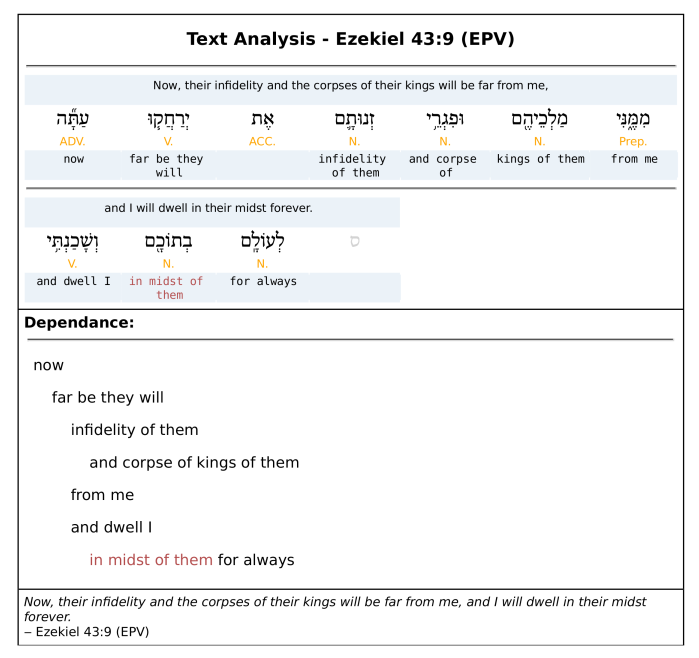Now let them put away their whoring and the dead bodies of their kings far from me, and I will dwell in their midst forever. (Ezekiel 43:9 ESV)
In whose midst is God going to be dwelling forever?
Now let them put away their whoring and the dead bodies of their kings far from me, and I will dwell in their midst forever. (Ezekiel 43:9 ESV)
In whose midst is God going to be dwelling forever?
Based on various parallel verses throughout Ezekiel, it seems very clear that 'in whose midst' refers to Israel or Judah (pp. 16:60, 37:26, 43:7,9 as below). The word you're choosing to translate 'forever' is one to take carefully, however. Let's consider the wider context of the book.
The word 'olam' (עולם) occurs 15 times in Ezekiel, and can be likened to 'eternal/everlasting/ancient' etc. All usages below:
Yahweh's everlasting [olam] covenant or dwelling with Judah or Israel: 16:60, 37:26, 43:7,9
An everlasting [olam] enmity which destroys Philistia: 25:15
Ancient [olam] people go down to judgement like the ancient [olam] waste places: 26:20
Everlasting [olam] destruction of Tyre and its king: 26:21, 27:36, 28:19
An ancient/unending [olam] hostility by Edom: 35:5, 9
Israel's possession of the ancient [olam] heights/mountains: 36:2
Everlasting [olam] possession of the land for Israel's descendants, David to be their prince forever [olam]: 37:25
Yahweh to set up his sanctuary in Israel's midst forever [olam]: 37:26,28
An everlasting [olam] ordinance of grain offerings: 46:14
We can see that obviously we're best trying to capture the breadth of meaning this word has, rather than replacing it with the English term 'forever'. The Septuagint translates the word as aiōnios, from where we get the term 'eon', which is an extremely long period but not 'forever'. Consider Matthew 28:20 as a great example, where a commission is given 'to the end of the aiōnos', which we typically render as 'to the end of the age'. This is fairly close to most usages we find in the OT too - some verses do seem to sound like 'forever', but others are more clearly about the fullness of an age past or present or future.
Thus in answer to your question, it's Israel primarily in scope here, but the 'forever' part is not straightforward. As with any other part of the scriptures, we need to weigh that against the rest of the material we have, and discourage 'prooftexting', especially where one or more words in a verse are ambiguous.
Related questions:
Does the Hebrew word 'olam' mean 'forever' in Leviticus?
How do you know when to understand the Hebrew word 'olam' as eternal?
Ezekiel 43:9 relies upon the reference to the "sons of Israel" in Ezekiel 43:7, as shown below.

Not all the "sons of Israel", however, will experience the full blessing of the presence of Yahweh in their midst, but only those the prophet states in Ezekiel 43:11, who "are ashamed of all they have done".